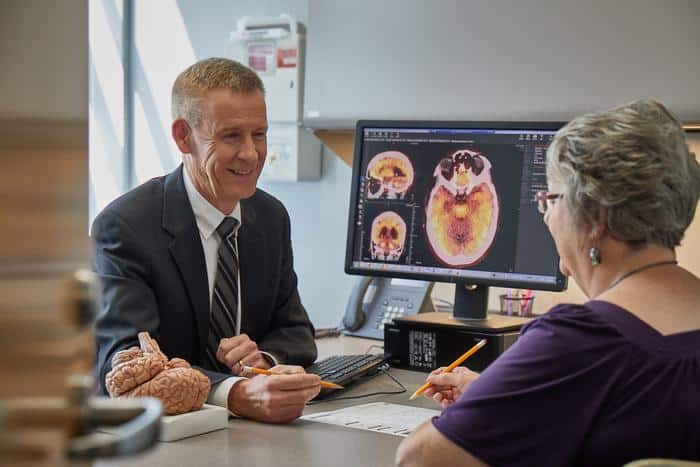Studies showed that common vaccines for illnesses like flu, pneumonia and shingles reduced people’s risk of Alzheimer’s by as much as 30 percent.
Research shows that certain widely distributed vaccines may offer benefits beyond just immunity against an infection: one might be helping to fend off Alzheimer’s. Flu vaccines have been shown to make people as much as 40 percent less likely to develop Alzheimer’s. Now, a new study from a team at UTHealth in Houston, Texas has found that it isn’t just the flu shot that has this protective benefit for the brain: Vaccination against tetanus, diphtheria and whooping cough; against herpes zoster (better known as shingles); and against pneumococcus bacteria (which causes pneumonia, meningitis, sinus infection, blood infection, and middle ear infection) earlier in life are all associated with a reduced risk for developing Alzheimer’s disease down the line.
The new findings, published in the Journal of Alzheimer’s Disease, come just over a year after the team’s earlier study finding that people who received at least one flu vaccine were 40 percent less likely to develop Alzheimer’s disease than their unvaccinated peers.
“We were wondering whether the influenza finding was specific to the flu vaccine,” said neurology professor and lead author Dr. Paul E. Schulz at McGovern Medical School in Houston. “This data revealed that several additional adult vaccines were also associated with a reduction in the risk of Alzheimer’s.”
According to Schultz, his team shares with other researchers the hypothesis that the immune system drives brain cell dysfunction in Alzheimer’s disease.
“The findings suggest to us that vaccination is having a more general effect on the immune system that is reducing the risk for developing Alzheimer’s,” he said.

The study on diphtheria, shingles and pneumococcus vaccines
For this study, the research team looked back at a group of patients who were free of dementia during a two-year period and were at least 65 by the start of the eight-year follow-up period. They compared those who were vaccinated versus unvaccinated and overlapped that comparison across those who developed Alzheimer’s and those who did not.
They found that people who received the Tdap vaccine for tetanus, diphtheria, and whooping cough and the Td vaccine for the first of those two diseases were both 30 percent less likely than their unvaccinated peers to develop Alzheimer’s disease (7.2 percent of vaccinated patients versus 10.2 percent of unvaccinated patients developed the disease).
For comparison, Schulz said, three new
anti-amyloid antibodies used to
treat Alzheimer’s have shown they slow
disease progression by about the same amount.
With the HZ vaccination, they found a 25-percent reduced risk of developing Alzheimer’s disease. People who received the pneumococcal vaccine and a similar — 27 percent — reduced risk of developing Alzheimer’s.
For comparison, Schulz said, three new anti-amyloid antibodies used to treat Alzheimer’s have shown they slow disease progression by 25 percent, 27 percent, and 35 percent.
However, there could be a number of other lifestyle factors — like consistent access to quality healthcare — that influence the risk differential between vaccinated and unvaccinated groups when it comes to their Alzheimer’s risk. More research is needed.
“We hypothesize that the reduced risk of Alzheimer’s disease associated with vaccines is likely due to a combination of mechanisms,” said Dr. Avram Bukhbinder, another author on the paper. “Vaccines may change how the immune system responds to the build-up of toxic proteins that contribute to Alzheimer’s disease, such as by enhancing the efficiency of immune cells at clearing the toxic proteins or by ‘honing’ the immune response to these proteins so that ‘collateral damage’ to nearby healthy brain cells is decreased. Of course, these vaccines protect against infections like shingles, which can contribute to neuroinflammation.”
Exploring the link between flu and pneumonia vaccines and brain health
The findings build on previous research. Two 2020 studies showed that flu and pneumonia vaccines significantly reduced people’s risk of Alzheimer’s. The findings presented in 2020 highlight that vaccines are not only critical to public health efforts of stemming and preventing deadly outbreaks of infectious diseases, but some may also play a role in protecting people’s cognition and brain health.
For the previous studies, the University of Texas researchers combed through medical records of more than 9,000 people age 60 and up and found that people who received at least one flu shot saw a 17 percent reduction in risk of Alzheimer’s. For people who got regular vaccinations, their risk dropped another 13 percent.
Timing of a vaccination seemed to matter as well. The protective effects of the vaccinations were the strongest for people who received their first vaccine at the age of 60, compared to those who waited until age 70.
In a separate study, scientists examined the link between the pneumonia vaccine and risk of Alzheimer’s in more than 5,000 older adults. People between the ages of 65 to 75 who received the vaccine had a reduced risk of developing Alzheimer’s of 25 to 30 percent. Those who did not carry a gene that increases risk for Alzheimer’s had the largest reduction in risk of up to 40 percent.
However, the researchers did not find any additional reduction in risk for people who received a flu vaccine as well as a pneumonia vaccine.
Alzheimer’s Association Chief Science Officer Maria C. Carrillo said at that time that continued research into the lasting health benefits of vaccines is critical in helping people understand that vaccines may be one among many factors linked to reducing dementia risk.
“It may turn out to be as simple as if you’re taking care of your health in this way — getting vaccinated — you’re also taking care of yourself in other ways, and these things add up to lower risk of Alzheimer’s and other dementias,” she said.
How vaccines protect against Alzheimer’s
While it’s unclear exactly why vaccines are associated with the risk of Alzheimer’s, researchers have proposed several theories. Albert Amran, a medical student at the McGovern Medical School at UTHealth and a researcher in the study of flu vaccines and Alzheimer’s, told WebMD that vaccines may protect against neurological complications of an infection by preventing a viral infection in the first place.
The researchers found that people who received
at least one flu shot saw a 17 percent reduction in risk of
Alzheimer’s. For people who got regular vaccinations,
their risk dropped another 13 percent.
Dr. Scott Kaiser, a geriatrician and the director of Geriatric Cognitive Health for Pacific Neuroscience Institute at Providence Saint John’s Health Center, said coping with an infection of flu or pneumonia can exert a heavy toll on the brain, especially in severe cases of infections. By protecting people from infections, vaccinations may, in turn, safeguard people’s brain functions.
“Getting sick with the flu or pneumonia, particularly with bad cases, can be taxing on the brain and increase your long-term risk of dementia,” Kaiser told Healthline. “So protecting yourself from flu and pneumonia, through vaccination, may very well be protecting your brain too.”
Scientists also speculate that vaccines may bolster the overall immune system. According to Svetlana Ukraintseva, an associate research professor in the Biodemography of Aging Research Unit at Duke’s Social Science Research Institute and a researcher in the study of pneumonia vaccines and Alzheimer’s, certain vaccines can lead to effects beyond their intended targets. While some of these effects may be harmful, others could help people build resilience.
“[Some vaccines] are known for so-called off target effects, which can be beneficial or detrimental,” Ukraintseva said in a 2020 seminar. “In the case of beneficial effects, they sometimes improve mortality, survival and risk of other diseases.”
Another factor that may contribute to the recent findings is that people who get vaccinated may be more likely to take better care of themselves, and live a healthier lifestyle. They may also see their doctors more frequently and receive more medical care.
Scientists say that more studies are needed to explore the biological mechanisms that may explain the link between vaccines, infectious diseases, and the risk of Alzheimer’s. Carillo of the Alzheimer’s Association added that large, diverse clinical trials are necessary to inform whether vaccinations can be an effective public health strategy to reduce risk of dementia.
Even aside from the link between vaccines and lower Alzheimer’s risk, scientists agree that vaccines are one of the greatest medical advances in modern times, protecting people against illnesses such as flu, pneumococcal disease, whooping cough, measles, rubella and mumps.

My father died from Alzheimer’s disease about 14 years ago. I am a retired nurse who is currently enrolled in an Alzheimer’s study. Just trying to do my part.
Research for Alzheimers disease has been taking place since 1906. It appears there is still a long way to go. Hopefully in the near future there will be a break through for the wonderfull research that has been conducted.